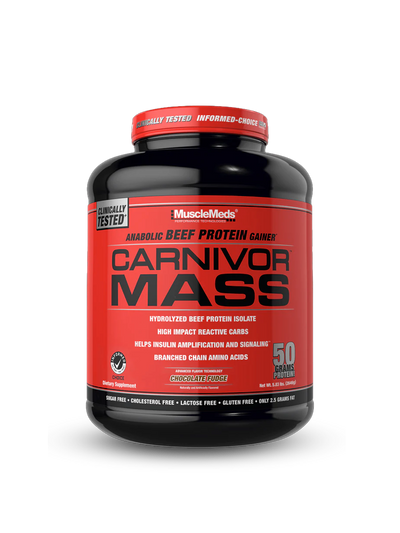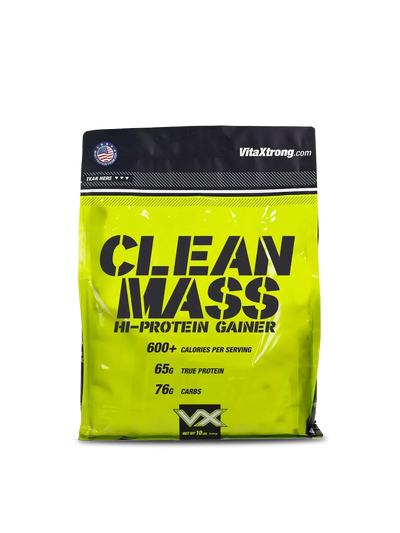Introduction
Selecting the right mass gainer supplement is a crucial decision for individuals aiming to gain muscle mass and weight effectively. With numerous options available in the market, it's essential to understand the factors that will help you choose a mass gainer that aligns with your fitness goals, dietary preferences, and nutritional needs. In this guide, we'll walk you through the key considerations for making an informed choice.
Your Fitness Goals
Your fitness goals play a pivotal role in determining the ideal mass gainer for your needs. Let's delve further into these specific fitness objectives and how they influence your choice of mass gainer:
1. Muscle Building:
- Goal: Gaining lean muscle mass is the primary aim for many individuals who incorporate mass gainers into their fitness regimen.
- Choice: To support muscle repair and growth, look for a mass gainer with a higher protein content. Protein is essential for repairing and building muscle tissue, and a protein-rich formula can help you achieve your muscle-building goals effectively. Aim for a product that provides at least 20-30 grams of protein per serving.
- Ratio: The carbohydrate-to-protein ratio in the mass gainer can vary, but for muscle building and body transformation, you may prefer a product with a balanced ratio or slightly more carbohydrates than protein. This balanced approach provides the necessary calories for muscle growth without overloading on carbohydrates.

2. Bulking:
- Goal: Bulking typically involves increasing overall body weight and muscle size.
- Choice: For bulking, you'll want a mass gainer with a well-balanced ratio of carbohydrates and protein. This balanced approach ensures that you're getting the necessary calories for muscle growth while also supporting overall weight gain. Look for a mass gainer with a 2:1 or 3:1 carbohydrate-to-protein ratio.
- Calories: Pay attention to the total caloric content of the mass gainer. Bulking requires a calorie surplus, so choose a product that provides an adequate number of calories to support your goals.
3. Recovery and Maintenance:
- Goal: Some individuals use mass gainers to aid post-workout recovery or to maintain their current weight.
- Choice: If your aim is to efficiently recover after workouts or maintain your weight, consider a mass gainer with a moderate caloric content. A protein-focused formula with a moderate carbohydrate-to-protein ratio can be suitable for these goals.
- Micronutrients: For recovery and maintenance, you may also benefit from a mass gainer that includes added vitamins and minerals to support overall health.
Ingredients and Quality
- Protein Source: Assess the source of protein in the mass gainer. Common options include whey protein, casein, plant-based proteins (e.g., pea, rice), or a blend. Ensure the protein source aligns with your dietary preferences and tolerances.
- Carbohydrate Type: Examine the carbohydrate sources. Complex carbohydrates like oats and sweet potatoes provide sustained energy, while simple sugars offer quick energy. The carbohydrate profile should match your energy needs and digestion preferences.
- Fats: Check the type and quantity of fats in the mass gainer. Healthy fats, such as MCTs (medium-chain triglycerides), can provide additional calories and promote energy.
- Artificial Additives: Avoid mass gainers loaded with artificial additives, fillers, or excessive amounts of sugar. Opt for products with minimal or no artificial ingredients.

Nutrient Profile
The nutrient profile of a mass gainer is a critical aspect to consider when making your selection. It directly affects how well the product aligns with your fitness goals and dietary preferences. Here's a breakdown of the key aspects of the nutrient profile to examine:
1. Caloric Content:
- Goal-Driven Calories: Assess the caloric content per serving and ensure it aligns with your daily caloric needs based on your specific fitness goals.
- Surplus for Bulking: If you're aiming to bulk and increase overall body weight, a mass gainer with a higher caloric content may be suitable. Bulking typically requires a calorie surplus.
- Moderation for Maintenance: For maintenance or recovery purposes, consider a mass gainer with a moderate caloric content. This provides the necessary nutrients without excess calories.
2. Protein Content:
- Muscle Building Focus: To support muscle building effectively, verify the protein content per serving. A good rule of thumb is to aim for at least 20-30 grams of protein per serving. Protein is essential for muscle repair and growth.
- Source of Protein: Pay attention to the source of protein in the mass gainer. Common options include whey protein, casein, plant-based proteins (e.g., pea, rice), or a blend. Choose a protein source that aligns with your dietary preferences and tolerances.
3. Carbohydrate-to-Protein Ratio:
- Carbohydrate Source: Examine the ratio of carbohydrates to protein in the mass gainer. Ratios can vary significantly between products.
- Balanced Ratio: A balanced 2:1 or 3:1 carbohydrate-to-protein ratio is often suitable for muscle building and post-workout recovery. It provides the energy needed for workouts and helps replenish glycogen stores.
- Adjust for Goals: Depending on your specific goals (muscle building, bulking, recovery, or maintenance), you may prefer a mass gainer with a slightly different carbohydrate-to-protein ratio.
4. Micronutrients:
- Added Vitamins and Minerals: Some mass gainers include added vitamins and minerals to enhance their overall nutritional profile. These micronutrients can be beneficial for your overall health and may help fill potential nutrient gaps in your diet.
- Consider Individual Needs: Depending on your dietary habits and potential nutrient deficiencies, you may prefer a mass gainer with specific added micronutrients. For instance, if you have a vitamin D deficiency, you may seek a product fortified with this vitamin.

Dietary Preferences
Dietary preferences play a significant role in choosing the right mass gainer, as they ensure that the supplement aligns with your lifestyle and dietary restrictions. Firstly, if you have food allergies or sensitivities, it's crucial to meticulously review the ingredient list of the mass gainer to guarantee there are no allergens present that could potentially trigger an adverse reaction.
Secondly, for individuals following plant-based diets, such as vegans or vegetarians, it's essential to seek out mass gainers explicitly designed for these dietary choices. These plant-based mass gainers utilize protein sources derived from plants like peas, rice, or soy, providing a suitable alternative to animal-derived proteins like whey or casein. This way, you can ensure that your mass gainer not only supports your fitness goals but also adheres to your dietary principles and helps you meet your nutritional needs while aligning with your dietary preferences.
Taste and Texture
Taste and Texture are two factors that significantly influence your experience with a mass gainer. First, let's talk about flavor options. Mass gainers are available in a wide array of flavors, ranging from classic chocolate and vanilla to more unique options like cookies and cream or birthday cake. Choosing a flavor that you genuinely enjoy is crucial because it encourages consistency in your supplementation. When you look forward to the taste of your mass gainer, you're more likely to incorporate it into your daily routine without feeling like it's a chore.
In addition to taste, mixability is equally important. A mass gainer that blends smoothly without forming clumps or an unpleasant, gritty texture is not only more enjoyable to drink but also easier to prepare. Good mixability ensures that you can quickly prepare your shake without the hassle of stirring endlessly or using a blender. This convenience factor can be especially valuable when you're on the go or in a hurry. Therefore, when selecting a mass gainer, consider both its flavor options and mixability to make sure you're getting a product that fits seamlessly into your daily routine and palate.

Budget
Budget considerations are a significant aspect of selecting the right mass gainer, especially if you're on a tight financial plan. When assessing the budgetary aspects of mass gainers, cost-effectiveness is a primary factor to evaluate. To make an informed choice, it's essential to compare prices and servings per container to understand the overall value you're getting for your money. Look beyond the initial price tag and calculate the cost per serving.
This calculation allows you to determine how much you're paying for each gram of protein, carbohydrate, and other nutrients provided by the mass gainer. In this way, you can find a product that offers a balance between quality and affordability, ensuring that you're investing in a mass gainer that aligns with your budget without compromising your fitness goals or nutritional needs.
Reviews and Recommendations
- User Reviews: Read user reviews and testimonials to gain insight into the product's taste, effectiveness, and any potential side effects.
- Expert Recommendations: Seek advice from fitness professionals, trainers, or nutritionists who can provide personalized recommendations based on your fitness goals and needs.
Conclusion
Choosing the right mass gainer requires careful consideration of your fitness goals, dietary preferences, and nutritional needs. By evaluating the ingredients, nutrient profile, and quality of the product, you can make an informed decision that supports your muscle-building journey effectively. Remember that the best mass gainer is the one that aligns with your specific goals and complements your overall diet and fitness regimen.








